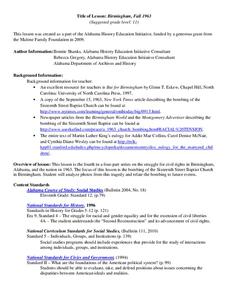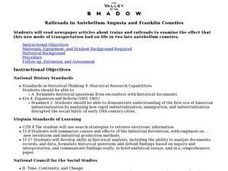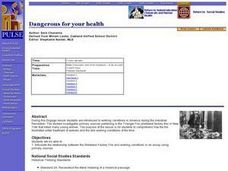Middle Tennessee State University
Fights, Freedom, and Fraud: Voting Rights in the Reconstruction Era
As part of a study of post Civil War era, young historians investigate the changes in voting rights during the Reconstruction Era (1863-1876), the fraud involved in the Hayes-Tilden presidential election of 1876, and efforts by Pap...
Roy Rosenzweig Center for History and New Media
Reconstruction
When slavery ended, what did the government do to help African American during Reconstruction? An interesting instructional activity uses primary sources such as newspaper articles to help scholars analyze Reconstruction policies and how...
Curated OER
U.S. History Worksheet #75
Get the facts straight when it comes to the Reconstruction Era! In this United States history worksheet, students utilize a word bank of 10 terms or phrases to answer 10 fill in the blank questions about the nation following the Civil...
Center for History and New Media
Founding of the Laurel Grove School and Other "Colored" Schools in Fairfax County, 1860–1890
The right to public education was not always so clear in American history. Readers study several primary and secondary source documents, including property deeds, maps, and photographs, about the founding of local schools during the...
Curated OER
Post Civil War Reconstruction
Students analyze the process of Reconstruction after the Civil War. In this U.S. History lesson, students discuss specific details about Reconstruction with the class, then complete a worksheet with multiple activities reinforcing...
Digital Public Library of America
Ida B. Wells and Anti-Lynching Activism
A packet of 13 primary sources provides young historians with insight into the anti-lynching activism of civil rights Ida B. Wells. Included are images of Wells, her letters, a political cartoon, newspaper lynching announcements, and a...
University of California
The Civil War: Effects of the Civil War
Imagine being on the front line of the Civil War —from the front porch of your own house. Scholars use visual evidence from primary and secondary sources to analyze the impact of the Civil War on all Americans. They examine the research...
Curated OER
Reagan and Bush: The Conservative Years
Students investigate the conservative agenda of the Republican Presidents Ronald Reagan and George Bush. They conduct Internet research, evaluate an edition of the Wall Street Journal, and write and publish a special-edition newspaper...
PBS
Primary Sources
Students see how to use primary and secondary sources to investigate history. Whether it is a photograph, book, map, letter, postcard, newspaper, or official document, students can use sources to reconstruct and relive history.
Curated OER
Unionism versus Secessionism in Virginia
Eleventh graders, in groups, analyze newspaper articles and then debate and discuss if Virginia should succeed from the Union or not.
Smithsonian Institution
Women's Role in the War Effort
Did you know that many women were Confederate spies during the Civil War? The resource focuses particularly on the important role women played for both the Union and Confederacy. It uses exercises such as a discussion, video, analyzing...
Alabama Department of Archives and History
Birmingham, Fall 1963
Can any good come from acts of evil? The 1963 bombing of the Sixteenth Street Baptist Church in Birmingham, Alabama, and the eventual outcomes of the tragedy, are the focus of a instructional activity that asks groups to examine primary...
Curated OER
Railroads in Antebellum Augusta and Franklin Counties
Eleventh graders are divided up into groups and work on separate worksheets. They reassemble as a class and discuss the different articles and how the railroads affected people's lives.
Curated OER
Dangerous for your health
Students articulate the relationship between the Shirtwaist Factory Fire and working conditions in an essay using primary sources. They are introduced to working conditions in America during the Industrial Revolution.















